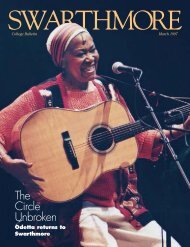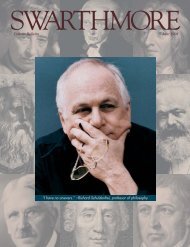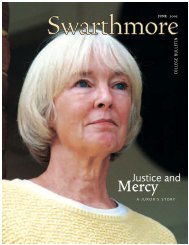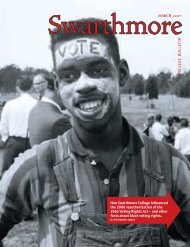TRUTH
Swarthmore College Bulletin (December 2006) - ITS
Swarthmore College Bulletin (December 2006) - ITS
- No tags were found...
You also want an ePaper? Increase the reach of your titles
YUMPU automatically turns print PDFs into web optimized ePapers that Google loves.
a soldier’sTALE“I DIDN’T WANT TO STAND BY WHILESOMEONE ELSE WENT IN MY PLACE,” WRITESSEAN BARNEY ’98. HE VOLUNTEEREDTO GO TO IRAQ, WHERE HE NEARLY DIED.By Sean Barney ’98ELEFTHERIOS KOSTANSMy former classmates at Swarthmore will besurprised, I think, to learn that I ended upin the Marine Corps. Those who knew mewell know that I am not an aggressive person.I don’t think I have resorted to violenceas a means to settle a dispute in all of mylife. Those who knew me well also know,however, that I have a passion for moral andpolitical philosophy and a long-standinginterest in philosophical questions surroundingmilitary service.One of the central principles of democracyis civilian control of the military. IfAmericans are to have civilian control of themilitary, we need a group of citizens who arewilling to carry out the decisions of ourelected civilian leaders, whether they agreewith the decisions in every instance or not.When President Clinton decided to intervenein the Balkans, for example, many inthe military disagreed with that policy. Yet,as a consequence of our tradition of civiliancontrol, even those who disagreed did theirduty and helped perform the mission. HadPresident Clinton chosen to intervene inRwanda—as he now says he should have—many in the military would have disagreedwith that decision as well. They would, however,have gone nonetheless. This is as itshould be. There can be no public policy in amodern society without public servants.This does not mean that democracyrequires a corps of military automatons. Asimportant as democratic, civilian control ofthe military is, it does not absolve soldiersof individual moral responsibility for theiractions. Indeed, there are certain orders thatservice members are duty bound to disobey.Keeping that extremely important caveatfirmly in mind, however, those of us whobelieve in democracy must recognize thatone of the basic requirements of a democraticsociety is assembling a group of menand women who are willing to act as publicservants and carry out the decisions thatemerge from our democratic processes.But who should these people be? Whoshould serve in our military? We need publicservants of many kinds, but, due to thenature of the sacrifice involved, “raising anarmy” has always raised particular moraland political questions. As one commentatorsaid recently, for thousands of youngAmericans the Iraq War has not been “acomma.” It has been “a period—a full-stopend to their lives.”In today’s economy, there is no greaterasset than a quality education. Being welleducatedand being well-to-do are increasinglysynonymous. During the last 50 years,however, being well-educated and beingestranged from the military have alsobecome increasingly synonymous. Now thatmilitary service is “all-volunteer,” the welleducatedand well-to-do are increasinglyabsent from the military’s ranks and thusIn October, Barney visited the Korean War Memorial in Philadelphia. He sayshis “military heroes are not officers. They are the World War II draftees whostormed the beaches at Normandy or raised the flag on Iwo Jima.”from the frontlines of our nation’s wars. Inthe 1950s, roughly half of all students whograduated from Harvard and Princetonserved a tour in the military. Today, less thanhalf of one percent do.This does not seem right to me. Nor doesit seem healthy for our society or for thewider world. The same progressive in mewho believes in graduated income taxationbelieves that the fortunate among us shouldshoulder their fair share of public burdens(other-than-financial), in wartime as well asin peacetime. In short, I believe in the oldfashionednotion, voiced by President-electJohn F. Kennedy in 1961, that “of those towhom much is given, much is required.”Our country’s deliberations and decisionmakingconcerning war and peace are likelyto be more judicious—more attentively andaccurately reflecting the true stakesinvolved—the more the children of America’sleadership class are represented amongthose who ultimately do the fighting anddying.After 9/11, the philosophical beliefs aboutmilitary service I had debated with friendsand professors at Swarthmore became morethan an academic matter. I was working inWashington, D.C., at the time, as a seniorlegislative aide to U.S. Senator Tom Carper(D.–Del.). I felt fortunate to be participatingin the high-level debates of our democracyat a critical time. Being of military age,though, I was uncomfortable. It was clearsoon after 9/11 that there was going to bewar of some kind, although it was not yetclear that we would end up in Iraq. It didnot seem right to me, at such an age and indecember 2006 : 25
















